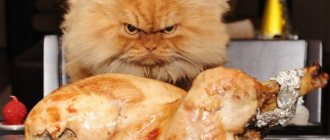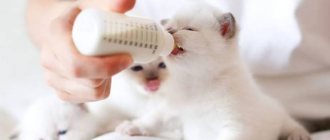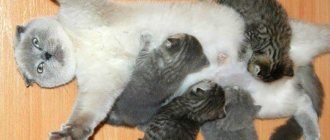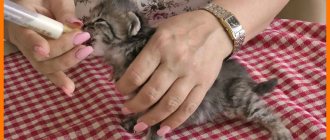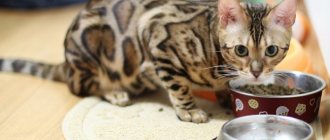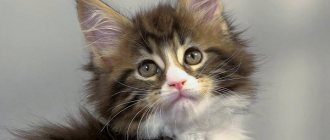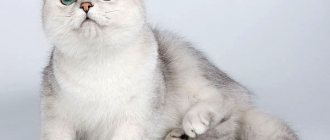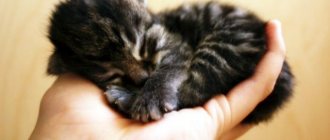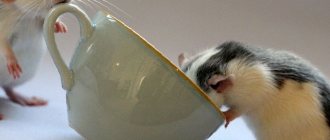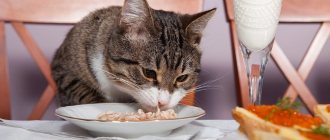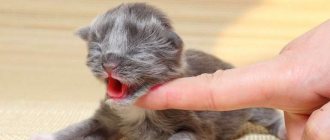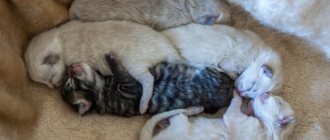A balanced diet is the key to the health and full development of kittens. The digestive organs are just beginning to develop, so attention should be paid to the correct transition to adult food. Fermented milk products, including cheese, help solve many important issues regarding the intensive growth of a pet.
Which cheese is safe for a cat?
Many cats perceive cheese as a delicious delicacy, a favorite treat. Pets often sit next to the table, begging for it. It can be very difficult to refuse a persuasive request, and the owner has doubts - is it safe to give cheese to the cat? After all, it contains many useful substances, including calcium, which is especially necessary for the animal, but the product’s fat content is also high.
© shutterstock
Cheese comes in different varieties and differs in fat content. Manufacturers offer customers to choose a product from five categories :
- low fat;
- easy;
- normal;
- double fat;
- triple fat.
The first of the two listed product categories produce skim milk; the others use whole milk and natural cream of varying concentrations in the recipe. You cannot feed your cat cheese with high fat content, it can cause dangerous disorders of its intestines and stomach.
The taste of the product is improved by additional ingredients. Manufacturers add natural spices, plant seeds, and nuts .
Recently, cheese has become “wrong” - to reduce its cost, factories use cheap vegetable milk substitutes; natural starters are not used, preferring chemical reagents and preservatives. Giving a cat cheese with this recipe is dangerous due to the high likelihood of an allergic reaction. Processed, smoked, moldy, salted cheese is on the list of foods dangerous for cats.
The health benefits of cheese for kittens
Cheese is a fermented milk product, rich in vitamins and minerals, well absorbed by the digestive system, and beneficial for the rapidly growing kitten’s body. The fermented milk product contains complete protein, which is necessary for the development of muscle mass of a “miniature predator”. Milk fat not only serves as a source of energy for active kittens, but also preserves fat-soluble vitamins and also improves the condition of the coat.
Calcium, which is rich in any type of cheese, is responsible for the formation of strong bones and a mobile spine, healthy teeth and sharp claws. An important macronutrient is absorbed worse from cheese than from cottage cheese. Should kittens be given cheese for complementary feeding or can they limit themselves to cottage cheese? Compared to cottage cheese or chicken eggs, cheese is more balanced in minerals and vitamins, which compensates for the reduced absorption of calcium.
In the first weeks of life, the immunity of furry babies is supported by the protective properties of colostrum. When switching to adult food, you should take care of the animal’s intake of vitamins and minerals. Regular feeding of cheese will provide kittens with vitamins C, A, E and choline, which will support the development of their own immunity. Phosphorus, potassium and other minerals will ensure the normal development of the organs and nervous system of your pet.
Lactose allergy test
You cannot feed a cat, especially a kitten, cheese at its first request. Before consuming a certain (low-fat) type of product for the first time, you need to find out or remember how the animal’s body reacts to lactose. This substance is included in any dairy product. If a cat develops indigestion - diarrhea - after eating this product, it is likely that this process will occur after feeding it cheese.
© shutterstock
Some animals cannot enjoy milk without “consequences,” but tolerate fermented milk products well. In this case, you can try using cheese to feed them. It should be introduced into the diet carefully, starting with a very small piece; you cannot immediately offer a large portion.
Cheese components can act as an allergen on the cat's body. Frequent manifestations of such reactions are problems with the animal’s skin; its hair may fall out significantly. If such signs appear, your pet’s diet should be adjusted.
And Murka got a piece of cheese somewhere
For many kittens, cheese is a real delicacy, so they will never refuse a portion of this tasty delicacy. Occasionally you can pamper your beloved pet with a small piece the size of a pad on your thumb.
Do not forget that many types of cheese are too salty and therefore are not suitable for cat food. You need to choose lightly salted and unleavened varieties, otherwise the animal risks getting gastritis or even an ulcer.
Cheese can be given to your pet as a treat, starting with the first or second complementary foods, no more than once or twice a week. It is worth paying attention to quality, since a kitten’s delicate stomach, “no larger than a thimble,” will not benefit from expired or junk-quality products.
Cheese is considered more balanced than, for example, eggs, but its composition may differ between varieties. However, American Peggy Perry gives her long-haired cat Katie half a piece of cheese every day and believes that in this way she prevents premature loss of hair follicles. According to her, you can use any cheese - from Swiss to Gouda or Cheddar, everyone will benefit.
Is it possible to give cats raw liver?
When purchasing a pet, you need to understand the responsibility that falls on your shoulders. Proper nutrition is the key to your pet’s health, but choosing natural food or dry food is everyone’s personal choice. The basis of any diet is proteins, but some are traditionalists and give the cat only meat, milk, fish, while others, due to their desire or circumstances, feed them exclusively with balanced dry food.
Veterinarians, as a rule, only recommend specialized expensive food, but the owner does not always agree with their opinion. Many people feed their pet exclusively natural food, but is it possible to feed raw meat, such as liver?
What is the harm of the product for a cat?
Cats are predators by nature. Therefore, many owners believe that feeding their cat raw liver or meat is the norm. After all, such animals are very dexterous, successful hunters, and often pamper themselves with fresh prey.
But it is in meat, in raw liver, that there may be larvae or eggs of many of the culprits of helminthic infestations and other parasitic diseases. Infection causes significant harm to the health of the pet, is the start of the development of many pathologies, and sometimes leads to the death of the cat.
Liver in any form is a “heavy” product; digesting a portion of it, especially a large one, requires a long period of time. The product can cause undesirable reactions from the cat’s intestines, these are two opposite phenomena - constipation or diarrhea. Each of them causes suffering.
Benefits of a raw food diet for cats
- Suitable for your specific species, i.e. obligate predator
- Your teeth are clean and white and your breath is fresher.
- Improves the immune system and maintains it at a high level
- Helps prevent and even reverse diseases such as kidney failure, urinary tract infections, allergies, cancer, obesity, diabetes, digestive problems and more
- Saves you money on potential prescription diets, medications and other vet bills
- Feces are less frequent, smaller, firmer and have virtually no odor
- Meat contains more moisture (dry food contains only 7-10% moisture)
- Pets are less likely to steal or beg for food
- Raw feeding is environmentally friendly
- Often, raw meat is cheaper than industrial feed
- Soft and shiny wool
- Cats don't need to eat as much because the food is packed with nutrients.
- Greater ability to avoid dyes, preservatives, artificial ingredients, etc.
- Cats get more quality energy without disruption
Unpleasant consequences after giving your cat cheese
The most unpleasant consequences after a cat eats cheese can be food allergies, stool upset, intoxication, or the development of urolithiasis. If you are lactose intolerant and consume cheese, the animal will suffer from indigestion for a long time. In the absence of help, serious changes occur, leading to exhaustion of the body.
Biological substances present in various types of cheese (for example, onions or garlic) can cause serious problems. Biological substances that are safe for humans and dangerous for cats provoke the onset of premature breakdown of erythrocytes (red blood cells). In ordinary hard high-quality cheeses, these substances are absent. But they are fully represented in the compositions of cheese spreads and processed cheeses, which attract the attention of cats due to the presence of flavorings and taste enhancers.
Other substances and components also cause harm to the cat’s body:
- Mold. A special mold used to make elite types of cheese leads to disturbances in the normal intestinal microflora. Mold that forms on old, spoiled cheese is also dangerous.
- Dyes. Natural dyes are often used by cheese producers to diversify their products. The stores offer cheeses colored with tomatoes, lavender or herbs. Synthetic and natural pigments are dangerous for the cat's body. For example, tomatoes are classified as nightshades, which contain a toxin that is dangerous to the life of a cat. The functions of internal organs and systems are affected by pigments of synthetic origin that can accumulate in the body.
Separately, it should be noted that taste enhancers provoke not only allergic reactions and addiction, but also a number of negative consequences for the animal’s body.
The risk of indigestion in a domestic cat increases when the owner tries to feed homemade dairy cheeses - feta cheese and cottage cheese, of dubious quality. Such products contain pathogens that cause stool upset, even serious intoxication.
Cheese must be without additives
This is a mandatory condition that the cheese product must meet. Unfortunately, most cheeses are not suitable for feeding cats for various reasons:
- Increased salinity . Salt is added to cheeses in large quantities in order to enhance their taste and increase shelf life. The saltiest types are old cheddar and feta. It is almost impossible to completely eliminate salt from your pet’s diet. But if there is an excess of it in the diet, the animal may experience health problems, for example, the electrolyte balance of the body may be disrupted.
- Presence of herbs, herbs and spices . Today, cream cheeses with distinct flavors are often found on shelves. They can be added with pepper, onion, garlic and other seasonings that are extremely dangerous for cats. They provoke the death of erythrocytes - red blood cells, which leads to the development of anemia.
- Using powdered milk instead of regular milk. Unfortunately, not all modern manufacturers adhere to state standards. Today, on store shelves you can often find fermented milk products that have little to do with milk. They are made from all kinds of substitutes and the least evil is the use of powdered milk instead of whole milk. But in any case, it is better not to feed your pet such a treat. It will do much more harm than good.
Before treating the mustachioed tabby with cheese, you should make sure that the product:
- not too greasy;
- not oversalted;
- does not contain additional additives harmful to animals.
- how to accustom a cat to homemade food;
- Can a cat have a raw egg?
- Can a cat eat raw meat?
This is interesting: What to do if your cat constantly asks for food?
Classification
Cheese making is a fairly developed food industry; accordingly, today there are many varieties of cheeses.
Fermented milk
They are made from completely fat-free milk, to which lactic acid starters are added. Cottage cheese, sour cream, salt, and butter can be added as additional ingredients. And certain types of fermented milk cheeses contain spices, coffee, herbs, cocoa, chocolate or vanillin.
Your pet's menu can include products consisting of cottage cheese or milk, without foreign ingredients.
Serum
They are obtained from the liquid that remains after cheese making - whey, that is, secondary raw materials. Because of this, whey cheeses are inferior in composition to previous varieties; they have little fat - from 15 to 25% and a large amount of albumin.
The most popular whey cheeses are:
- ricotta;
- feta;
- feta cheese;
- Adyghe
The last product is better suited for cats than the others. It is of high quality, does not contain spices and herbs, as well as other components harmful to the health of cats, and is relatively inexpensive. It is rich in vitamins and microelements.
Mold
During the cooking process, raw materials are exposed to mold fungi. In most cases these are organisms from the genus Penicillium. Mold cheeses have medium fat content, the figure varies from 25 to 35%.
They are prepared without flavoring and aromatic additives, since the action of mold provides the pronounced taste of cheese products. These products are allowed to be given to cats. But the first time, a small piece is enough, since the animal may become allergic to the fungus.
Smoked
Suluguni and sausage cheeses are very popular in Russia. They acquire a pronounced smoked flavor during processing under high temperatures. Then the product is dehydrated, it is saturated with components with a bacteriostatic, preservative effect and polycyclic carcinogens.
Such cheeses have no place on a cat’s menu, as they contain a lot of salt and preservatives. And this negatively affects the general condition of pets, as well as the gastrointestinal tract and coat.
Rennet
Like other varieties, these cheeses are made from milk, which is affected by the rennet enzyme - rennin (chymosin). They have a high fat content - from 40 to 50%, so it is not advisable to feed them to a cat.
Among the varieties of rennet cheeses, only hard and soft ones can be given to pets. But pickled varieties are too salty with spices in their composition, for this reason they are absolutely not suitable for furry pets.
